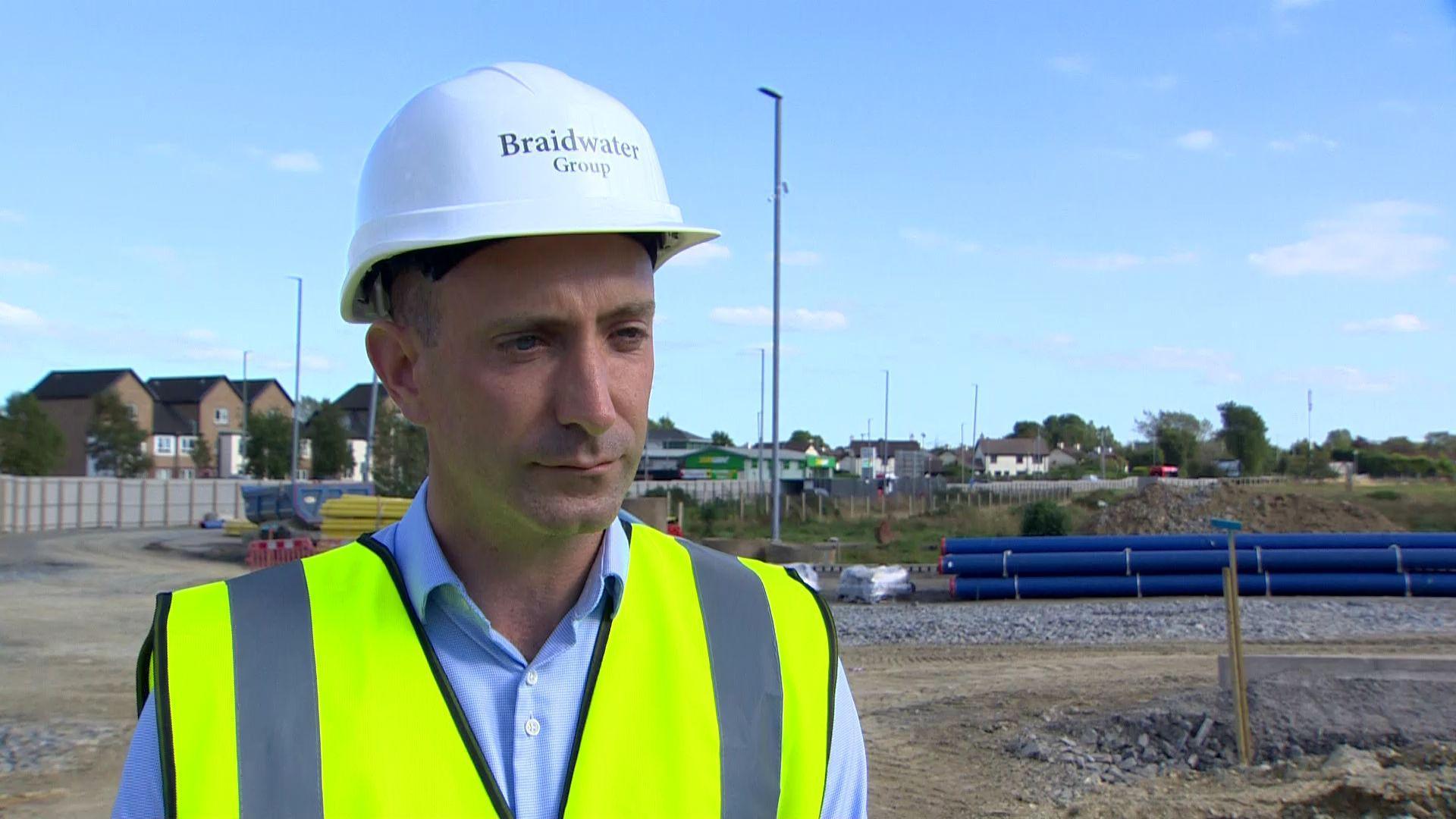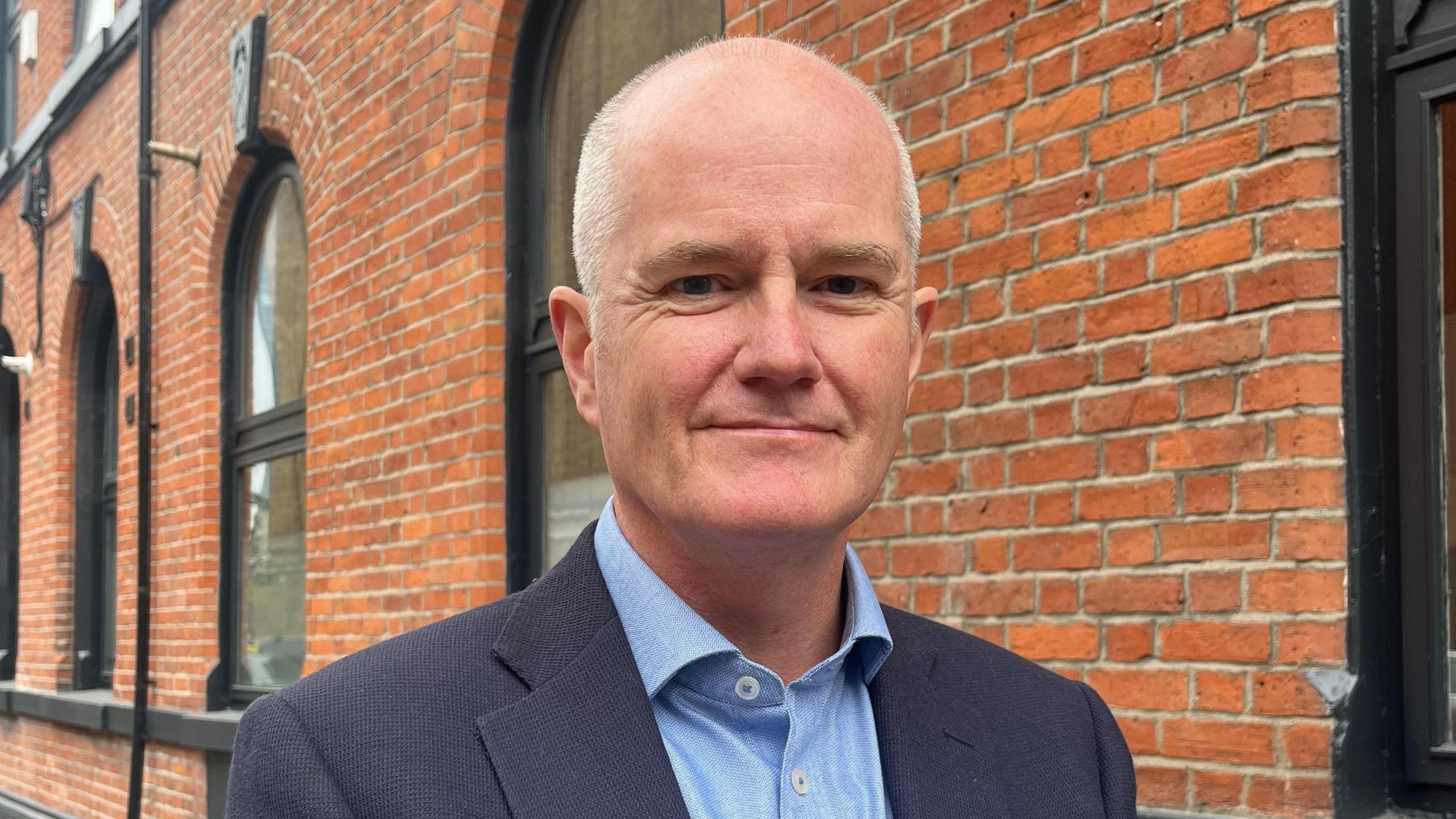Housebuilders could be asked to help pay water costs

Joe McGinnis Managing Director of Braidwater Group
- Published
Housing developers could be asked to pay to upgrade water treatment works as a way to tackle a housebuilding crisis under new proposals being considered by the infrastructure minister.
John O’Dowd told BBC News NI his officials were examining whether new legislation would be needed to allow developer contributions.
But those working in the industry have said a one size fits all approach will not work.
Housebuilding in Northern Ireland fell to a 60-year low last year, partially due to restrictions on new connections to an underfunded water system.
Plans for an estimated 19,000 homes are being held up due to the restrictions.
'We haven't even delivered one home'
One such project is a site on the Buncrana Road in Londonderry where the Braidwater Group plans to build over 2,500 new homes, but the design and the delivery of the project has already been set back a number of years.
Managing director Joe McGinnis said: "It's taken decades to get to this point—we've invested majorly and there are a number of people that were involved in this before us, and at this stage we haven't even delivered one home.
"This is more than 1,000 homes in the first phase—private, affordable, and social—we're investing over £5m in the infrastructure to open the site, like the pipes and the roads.
“It's over 2,500 homes in total; neighbourhood shopping, community open space, and contribution to local infrastructure has been embedded in the planning permission."
He said it was "very disappointing" to find out in July that there was no money to do £15m worth of upgrades at a nearby pumping station.
Mr McGinnis said he does not feel there is a “one size fits all” answer to the challenges they are facing.
He is calling for a full review of governance and funding of NI Water, as suggested by NI Audit Office, before any changes to legislation.
'I am looking at developer contributions'
One of the key priorities outlined in Stormont's Programme for Government is to provide more social, affordable, and sustainable housing.
O'Dowd said he had the support of executive colleagues in the belief that NI Water needs further investment.
"I am looking at developer contributions to see if we have to change legislation to allow developers to be able to contribute to the upgrade of wastewater treatment works," he said.
“I'm also introducing new legislation in relation to sustainable drainage, which is storing storm water and allow it to release slower so that it doesn't overpower wastewater works.
"Even if NI Water was fully funded at this stage, we could only supply 4,500 new properties on to the system. There are currently possible solutions for another 18,000 properties.
"That means NI Water and developers working together to find localised solutions,”

Mark Spence says housebuilding numbers are at their lowest for 60 years
The Construction Employers Federation in Northern Ireland has warned about the impact this was having on the industry.
Chief Executive Mark Spence said: "While the housebuilding numbers are at their lowest for 60 years, next year they will be lower again.
"That could be the lowest since World War II."
He is calling for an independent, expert-led review into how to fund NI Water, which he says has also been supported by the Northern Ireland Audit Office.
He said the idea of developer contributions is a "small piece of the jigsaw" which would have "minimal impact."
He said it would only unlock the very largest sites where the multimillion cost can be spread across a large number of house sales and still allow them to be affordable.
Some developers, he said, are now looking to work outside of Northern Ireland because of these problems or considering stopping work altogether.
"We are hearing this from many developers in Northern Ireland; several of them have already started working in Scotland, the north of England, and the Republic. Others are simply looking into whether their businesses are still viable," Mr Spence said.
A spokesperson for NI Water said the wastewater system is at capacity due to historical underinvestment.
It says its current budget allocation from the Department for Infrastructure is less than levels the Utility Regulator determined necessary for both operating costs and capital investment.
As a result, it said: "We are working through a process of prioritising the asset investments that may progress. Inevitably, this means there is investment that has been planned that is now being deferred.”